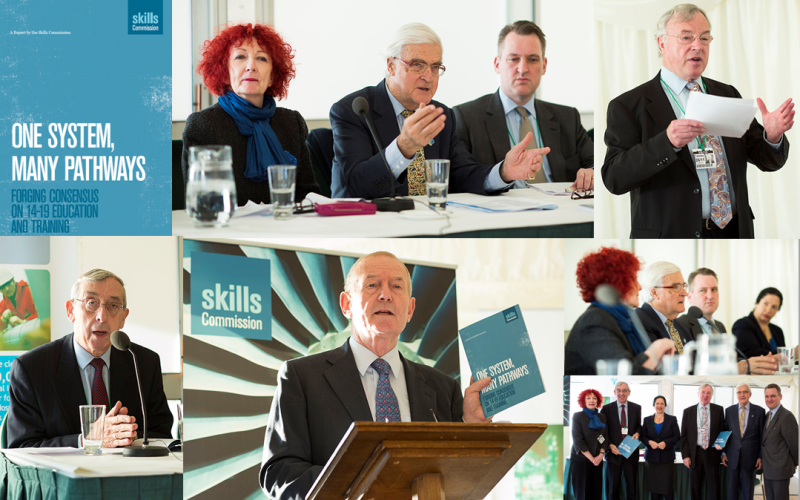One System, Many Pathways
Launched in November 2013: 'One System, Many Pathways' seeks to find consensus across the education and training sector and create a blue print upon which future policy should be assessed. This 'Values Consensus' is based on five guiding principles that will keep learners at the centre of education and training policy.
The report was launched formally in Parliament on November 26th at a panel debate seminar featuring Lord Baker and both inquiry co-chairs.
The report warns that government educational reforms since 2010 have failed to provide a coherent system of education and training with sufficient learning options for individuals not wanting to follow traditional academic pathways.
It criticises the current education system for failing to put individual learners’ needs at the heart of policy making and provision and further condemns the ‘crisis’ in the lack of information, advice and guidance for younger learners, and calls on the Department for Education to launch a full review of available support urgently.
The report is the result of a cross-party inquiry chaired by Sir Mike Tomlinson, former Chief Inspector of Schools, and Ian Ferguson, Chairman of Trustees at Metaswitch.
The report proposes a ‘Values Consensus’ framework to guide future education and skills policy decision making.
Consisting of five guiding principles, the ‘Values Consensus’ framework calls for:
Focusing always on ‘what is right’ for each and every learner;
Ensuring ‘dynamic quality’ across the whole of the 14-19 system of education quality;
Achieving fairness across the whole 14-19 system;
Enabling transfer between pathways within the 14-19 system;
Creating real choice through effective information, advice and guidance;
The report makes more than a dozen recommendations for policy and cultural change in the UK education landscape, including calling on the Department for Education to examine ways to create and facilitate a new culture of acceptance of learners repeating a year in order to ensure the learning experience is built around the individual’s particular learning requirements.
The report further calls on employers and employer bodies to engage more fully with education providers, with the creation of ‘associate governors’ to link local employers to schools and education providers more systematically.
The report has been supported by City & Guilds and Interserve.
Inquiry co-chair Sir Mike Tomlinson:
“Our vision for learners is of one, encompassing, coherent system of education and training that is characterised by a diversity of pathways, with clear routes of progression to employment, further training or higher education - whatever is right for the learner.
Rigorous academic pathways into higher education are vital. But we must be mindful that recent reforms’ focus on academic rigour does not come at the expense of other pathways to employment, further training and, indeed, higher education”
Fellow inquiry co-chair, Ian Ferguson CBE:
“The question we have asked throughout this inquiry - and the question each element of the 14-19 sector must ask of itself - is: is this policy, programme, qualification, institution, contributing positively towards creating a system that is in the best interests of all learners from the age of 14 to 19, in particular as they begin to transition to employment and to being adult members of our society”
The Skills Commission’s previous report, published last month, called on the Further Education sector to refocus its energy on ensuring its systems of intervention are fit for purpose and geared towards ensuring not just compliance, but increasing quality of education provision for learners across the new and evolving FE landscape.





